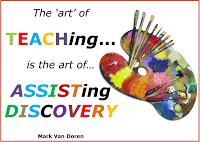By Allan Alach
I welcome suggested articles, so if you come across a gem, email
it to me at allanalach@inspire.net.nz
Preschool
teachers need better training in science
‘Gerde
said preschool teachers may struggle with science due to lack of quality
training, preparation or an aversion to science. Teachers may also feel
pressure from policymakers and school administrators to focus on literacy -- to
the possible exclusion of science.’
http://bit.ly/2fAmqd6
Another
Example of Less Teaching Leading to More Learning
Delinquent boys made huge academic gains when freed from
classroom lessons.
 |
| Teach less - observe more |
Don’t panic - its not what you think!
‘Every
September it seems like there’s a new Whole School Initiative hitting the fan.
As the Headteacher takes the podium on that first inset day, you hold your
breath, waiting to find out what new, quirky trend will permeate your staff
meetings for the year ahead…
But
what if your headteacher stood up and told you that this month is all about Naked Teaching?…Are
you game for it?’
11
Research-Based Classroom Management Strategies
‘Do
unresolved behavior issues keep you awake at night thinking about what
strategies might enhance responsible decision making and increase academic
learning time? It’s natural to feel personally and professionally challenged—as
I have, too many times to count.
The
good news is that there are some research-based strategies called kernels that
you can add to your classroom management toolkit.’
Those
Who Can’t
Variation of the original, supposedly written by George Bernard
Shaw.
T’hose
who can’t,Teach.
For example,
Those who can’t sit alone at a desk all day,
Whose energy demands movement and interaction,
Teach ….’
'Yet it rests on a fundamentally flawed premise. Contrary to public perception, the economy doesn’t actually need that many more programmers. As a result, teaching millions of kids to code won’t make them all middle-class. Rather, it will proletarianize the profession by flooding the market and forcing wages down – and that’s precisely the point.’
Contributed
by Bruce
Hammonds:
Does Mindfulness Actually Work in Schools?
 ‘A research team in Chicago has
spent a year studying whether students who are taught to be in touch with their
emotions do better academically. And they say the initial results are
promising.Perhaps counterintuitively, when kids take a break from a classroom
lesson on the solar system to spend a quiet moment alone watching a
three-minute nature video, or participate in a teacher-guided breathing
exercise with their class after lunch, they seem to become better overall
students. That’s likely because the children have a renewed sense of focus.’
‘A research team in Chicago has
spent a year studying whether students who are taught to be in touch with their
emotions do better academically. And they say the initial results are
promising.Perhaps counterintuitively, when kids take a break from a classroom
lesson on the solar system to spend a quiet moment alone watching a
three-minute nature video, or participate in a teacher-guided breathing
exercise with their class after lunch, they seem to become better overall
students. That’s likely because the children have a renewed sense of focus.’
The Curious Incident of the
Choice-Based Classroom
‘Don't touch things without
permission. Only ask questions when it's appropriate. Generally, by the middle
of 2nd grade, our students have internalized these messages regarding respect
and orderliness in the classroom. As a K–8 visual arts teacher, I've noticed
how students' innate curiosity about their surroundings diminishes as the years
go by, often at the prompting of well-intentioned teachers reminding students
to "wait and see" what materials they'll need before touching
anything. Although I do appreciate the lesson in respect, I sympathize with my
students, knowing that feeling that paint brush on their hand or squishing the
clay with their fingers would pique their curiosity for learning.’
Increased stress pushing New Zealand principals away, departing school leader says
‘The principal of a top
Taranaki school has resigned after 12 years in the role - and says other school
leaders have congratulated him for getting out of an increasingly stressful
profession. Charles Gibson is one of five Taranaki principals and deputy
principals leaving their posts this year.While Gibson said he was mostly
leaving Lepperton Primary School because it is "the right time to do
something a little different", he warned the stresses of the job, national
standards, and a lack of respect for teachers from the Ministry of Education
had all been contributing factors and were putting others off taking up top
positions.’
Facts Don’t Change People’s
Minds. Here’s What Does
Something to consider when debating
education with others:
‘Drowning the other person with
facts, I assumed, was the best way to prove that global warming is real, the
war on drugs has failed, or the current business strategy adopted by your
risk-averse boss with zero imagination is not working.Since then, I’ve discovered a significant problem with this approach.
It doesn’t work.’
From
Bruce’s ‘goldie oldies’ file:
A living world - the end of
industrial aged thinking.
 |
| Linear thinking |
‘It is time we appreciated that
the 'machine age' is over. The idea that ‘man’ can control and dominate
everything has had terrible environmental and social consequences. It is far
better to see the world, and all our organizations, as living systems and to
see our role as part of a range of integrated systems than underpin all life.
This ‘systems thinking’ is the new 'world view' that we all need to learn to
appreciate. Strangely enough the concept has direct links with earlier
indigenous wisdom that everything is interrelated, often in ways we can’t at
first recognize.’
 Educational failure - it is all
about poverty
Educational failure - it is all
about poverty
‘In recent years, though, we
have gained considerable insights into the pre-requisites for human fulfilment.
Health and security may be at the top of the list, but we also thrive on
community, fairness, bonding, altruism, playfulness and celebration.
Politicians would do well to look to these biological principals.’























































